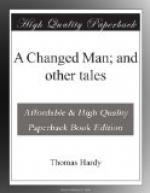‘Indeed!’
‘Not a very long time before—a short time. And it is about a lover,’ she faltered.
‘I don’t much mind that,’ he said mildly. ’In truth, I was in hopes ‘twas more.’
‘In hopes!’
‘Well, yes.’
This screwed her up to the necessary effort. ’I met my old sweetheart. He scorned me, chid me, dared me, and I went and married him. We were coming straight here to tell you all what we had done; but he was drowned; and I thought I would say nothing about him: and I married you, David, for the sake of peace and quietness. I’ve tried to keep it from you, but have found I cannot. There—that’s the substance of it, and you can never, never forgive me, I am sure!’
She spoke desperately. But the old man, instead of turning black or blue, or slaying her in his indignation, jumped up from his chair, and began to caper around the room in quite an ecstatic emotion.
‘O, happy thing! How well it falls out!’ he exclaimed, snapping his, fingers over his head. ’Ha-ha—the knot is cut—I see a way out of my trouble—ha-ha!’ She looked at him without uttering a sound, till, as he still continued smiling joyfully, she said, ’O—what do you mean! Is it done to torment me?’
’No—no! O, mee deer, your story helps me out of the most heart-aching quandary a poor man ever found himself in! You see, it is this—I’ve got a tragedy, too; and unless you had had one to tell, I could never have seen my way to tell mine!’
‘What is yours—what is it?’ she asked, with altogether a new view of things.
‘Well—it is a bouncer; mine is a bouncer!’ said he, looking on the ground and wiping his eyes.
‘Not worse than mine?’
’Well—that depends upon how you look at it. Yours had to do with the past alone; and I don’t mind it. You see, we’ve been married a month, and it don’t jar upon me as it would if we’d only been married a day or two. Now mine refers to past, present, and future; so that—’
‘Past, present, and future!’ she murmured. ’It never occurred to me that you had a tragedy, too.’
‘But I have!’ he said, shaking his head. ‘In fact, four.’
’Then tell ’em!’ cried the young woman.
’I will—I will. But be considerate, I beg ’ee, mee deer. Well—I wasn’t a bachelor when I married ’ee, any more than you were a spinster. Just as you was a widow-woman, I was a widow-man.
‘Ah!’ said she, with some surprise. ’But is that all?—then we are nicely balanced,’ she added, relieved.
‘No—it is not all. There’s the point. I am not only a widower.’
‘O, David!’
’I am a widower with four tragedies—that is to say, four strapping girls—the eldest taller than you. Don’t ’ee look so struck—dumb-like! It fell out in this way. I knew the poor woman, their mother, in Pen-zephyr for some years; and—to cut a long story short—I privately married her at last, just before she died. I kept the matter secret, but it is getting known among the people here by degrees. I’ve long felt for the children—that it is my duty to have them here, and do something for them. I have not had courage to break it to ’ee, but I’ve seen lately that it would soon come to your ears, and that hev worried me.’




